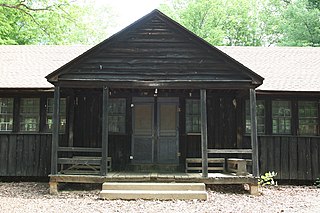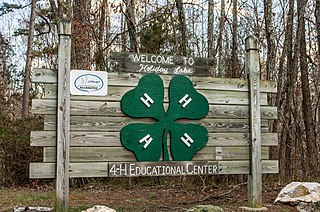
Courtland is an incorporated town in Southampton County, Virginia, United States. It is the county seat of Southampton County.

First Landing State Park offers recreational opportunities at Cape Henry in the independent city of Virginia Beach, Virginia. As the first planned state park of Virginia, First Landing is listed on the National Register of Historic Places as Seashore State Park Historic District. A portion of the park is listed as a National Natural Landmark as part of the Seashore Natural Area.

Sky Meadows State Park is a 1,862-acre (754 ha) park in the Virginia state park system. It is located in extreme northwest Fauquier County, Virginia in the Blue Ridge Mountains, near Paris, Virginia. It is about an hour outside of the Washington, D.C. metro region.

Western State Hospital, called Western State Lunatic Asylum in its early years, is a hospital for the mentally ill in Staunton, Virginia, which admitted its first patient on July 24, 1828.

Westmoreland State Park lies within Westmoreland County, Virginia. The park extends about one and a half miles along the Potomac River and covers 1,321 acres. The Horsehead Cliffs provide visitors with a panoramic view of the Potomac River, and lower levels feature fossils and beach access. The park offers hiking, camping, cabins, fishing, boating and swimming, although mechanical issues have kept the swimming pool closed since 2021. Located on the Northern Neck Peninsula, the park is close to historical sites featuring earlier eras: George Washington's birthplace and Stratford Hall, the birthplace of Robert E. Lee.

Holliday Lake State Park is a state park located within the confines of Appomattox-Buckingham State Forest in Virginia. The land was cleared as farmland in the 1880s before being returned to its forested state in the mid-20th century. Today, the park is known for its fishing opportunities.
Zoar State Forest is a state forest located in King William County, Virginia, near the town of Aylett. It is used to grow timber and agricultural crops, maintain habitat for various species of wildlife, and to provide educational and recreational opportunities. All state forests are managed by the VDOF for multiple-use purposes, including watershed protection, recreation, timber production, fishing, and applied forest research. The state forests are self-supporting. In addition, one-fourth of all income is returned to King William County. Income is received from the sale of forest products.

Trenton, also known as the "Brick House," is a historic plantation home located near Cumberland, Cumberland County, Virginia. It was built about 1829, and is a 2+1⁄2-story, brick dwelling with a center-passage, double-pile floor plan, in the Federal style. It has transitional elements of the Early Classical Revival style. A one-story, shed roofed addition was built about 1960. Also on the property are a contributing stable, brick shed/smokehouse,, grading building, and family cemetery. In 1936, the property was acquired by the Resettlement Administration and conveyed by deed to the Department of Conservation and Economic Development in 1954. Since then, it was used as the State Forest superintendent's home for the Cumberland State Forest until 1990.

The Oakwood–Chimborazo Historic District is a national historic district of 434 acres (176 ha) located in Richmond, Virginia. It includes 1,284 contributing buildings, three contributing structures, five contributing objects and four contributing sites. It includes work by architect D. Wiley Anderson. The predominantly residential area contains a significant collection of late-19th and early-20th century, brick and frame dwellings that display an eclectic mixture of Late Victorian, Queen Anne, and Colonial Revival styles.

The Goodwill Historic District, Chopawamsic RDA Camp 1 near Triangle, Virginia dates from 1934. It has also been known as Prince William Forest Park, as Camp Lichtman, and as Boys' Camp. It was listed as a historic district on the National Register of Historic Places on June 12, 1989. The listing included eight contributing buildings, one contributing structure and one contributing site on 13 acres (5.3 ha).

The Mawavi Historic District, Chopawamsic RDA Camp 2 near Triangle, Virginia, United States, dates from 1942. It was listed on the National Register of Historic Places in 1989.

The Orenda/SP-26 Historic District, Chopawamsic RDA Camp 3, near Triangle, Virginia dates from 1934. It was a Recreational Demonstration Area camp that includes work designed by the National Park Service and built by the Civilian Conservation Corps. Building styles within the district include NPS rustic architecture.

The Pleasant Historic District, Chopawamsic RDA Camp 4 near Triangle, Virginia dates from 1934. It was listed on the National Register of Historic Places in 1989. It includes NPS rustic architecture and is within what is now Prince William Forest Park. The listing included 36 contributing buildings and three contributing structures on 132 acres (53 ha).

Holiday Lake 4-H Educational Center, also known as Surrender Grounds Forest and Holiday Lake 4-H Camp, is located within the confines of Appomattox-Buckingham State Forest near Appomattox, Appomattox County, Virginia.

Bristersburg Historic District is a national historic district located at Bristersburg, Fauquier County, Virginia. It encompasses 19 contributing buildings, 1 contributing site, 1 contributing structure, and 1 contributing object in the rural crossroads of Bristersburg. They include three dwellings, a church, a school, and three stores. Notable buildings include the Tulloss Brothers Store, Zoar Baptist Church (1852), Bristone House, Compton’s Store, Eskridge House, The Bristersburg School (1910) and Payne's Store.

Foster Falls Historic District is a national historic district located near Max Meadows, Wythe County, Virginia. The district encompasses 12 contributing buildings, 2 contributing sites, and 3 contributing structures in the village of Foster Falls. They are primarily industrial and commercial buildings and structures built in the late-19th century. They include the iron furnace stack, the rail bed and frame railroad passenger station, a general store building, and a combination gristmill/sawmill. The district includes the Foster Falls Hotel, a late-Victorian style brick building. The hotel property includes two brick dependencies associated with an orphanage that occupied the hotel building beginning in 1938. It now serves as the headquarters of the New River Trail State Park.

Franklin Historic District is a national historic district located at Franklin, Virginia. The district includes 226 contributing buildings and 1 contributing site in the city of Franklin. It includes residential and commercial buildings that were primarily built during the late 19th- and early 20th-century. Notable resources include the Poplar Springs Cemetery, Camp Family Homestead, the former W.T. Pace Hardware Store, former U.S. Post Office (1916), Franklin Professional Building (1920s), Lyons State Theatre (1930s), Pretlow Peanut Company Warehouses, High Street Methodist Church (1890s), Emmanuel Episcopal / Grace Lutheran Church, and Franklin Elementary School (1922). Located in the district is the separately listed The Elms.

The Laburnum Park Historic District is a national historic district located at Richmond, Virginia. The district encompasses 226 contributing buildings and 2 contributing structures located north of downtown Richmond. The primarily residential area developed starting in the early-20th century as one of the city's early "streetcar suburbs" and as home to several important local institutions. The buildings are in a variety of popular early-20th century architectural styles including Queen Anne and Colonial Revival. It was developed as neighborhood of middle-to-upper-class, single-family dwellings. Notable buildings include the Laburnum House (1908), Richmond Memorial Hospital (1954-1957), Richmond Memorial Hospital Nursing School (1960-1961), "The Hermitage" (1911), Laburnum Court (1919), Veritas School.

The Main Street Banking Historic District is a national historic district located in downtown Richmond, Virginia. The district encompasses 19 contributing buildings located south of the Virginia State Capitol and west of the Shockoe Slip Historic District. It is the location of a number of buildings built for or occupied by banking institutions. The district includes representative examples of the Late Victorian and International Style architecture built between about 1865 and 1965. Notable buildings include the Virginia Employment Commission Building (1960), the 700 Building (1964), the Ross Building (1964), the Fidelity Building (1965). Located in the district is the separately listed First National Bank Building.

The Forest Hill Historic District is a national historic district located at Richmond, Virginia. The district encompasses 1,106 contributing buildings and 5 contributing structures located south of downtown Richmond. The primarily residential area developed starting in the early-20th century as one of the city's early "streetcar suburbs." The buildings are in a variety of popular late-19th and early-20th century architectural styles including frame bungalows, Colonial Revival, Tudor Revival, and Mission Revival. The buildings in Forest Hill exemplify a high quality of materials in their construction. Brick is the dominant building material. Notable non-residential buildings include Forest Hill Presbyterian Church; Good Shepherd Episcopal Church; and Forest Hill Church of Christ.























